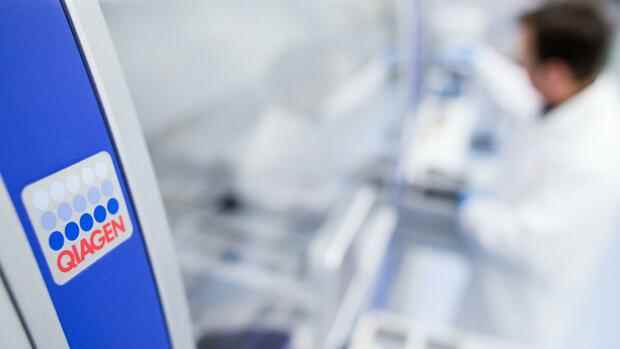The diagnostics group expects shrinking sales and profits in 2022.
(Photo: dpa)
Frankfurt After strong growth in 2021, the diagnostics group Qiagen is preparing for shrinking sales and profits this year. According to current expectations, the business with Covid-19 products and tests should halve, said Qiagen CFO Roland Sackers in a conference call.
It is difficult to predict how the pandemic will develop over the course of the year. After sales of 704 million dollars with Covid 19 products in 2021, CFO Sackers is currently only planning around 350 million dollars this year. Of this alone, 200 million dollars are to be implemented in the first quarter.
The manager is confident in the non-Covid-related business, which, following a portfolio expansion last year, is expected to see sustainable double-digit growth from 2022. Overall, Qiagen expects 2022 sales of at least $2.07 billion and adjusted diluted earnings per share of at least $2.05.
The stock market apparently shares Sackers’ optimism: In Frankfurt, Qiagen shares rose by more than five percent to EUR 45.23 on Thursday morning.
Top jobs of the day
Find the best jobs now and
be notified by email.
Qiagen manufactures sample preparation products and test technologies for molecular diagnostics. This can be used to detect many diseases. One of Qiagen’s main sources of revenue is a test to detect tuberculosis.
In the corona pandemic, Qiagen also launched Covid-19 test products. Molecular diagnostic PCR tests are considered the gold standard for detecting a Sars-Cov-2 infection.
Demand for Covid-19 products fluctuates greatly
Due to the high demand for PCR tests and test materials caused by the pandemic and strong growth in business not related to Covid-19, the company’s sales grew by 20 percent last year to $ 2.25 billion (about 1.97 billion euros). Adjusted diluted earnings per share increased 23 percent to $2.65. Both values exceeded expectations.
In the fourth quarter in particular, the company developed more strongly than forecast. Currency-adjusted group sales increased by four percent, the company had expected a decline of nine percent. The group benefited primarily from good business with products unrelated to Covid-19, while sales of corona test products fell by seven percent at constant currency in the fourth quarter.
Sackers justified this development with the strong fluctuations in demand for Covid-19 products, depending on the infection waves and national test strategies. Some countries have significantly reduced the PCR tests. Some countries like Germany rely heavily on antigen self-tests.
Qiagen does not produce such tests and, unlike diagnostics manufacturers such as Siemens Healthineers and Roche, cannot benefit from the German strategy. The US diagnostics manufacturer Abbott also reports overall lower sales of Covid-19 PCR tests compared to the same period last year.
More on diagnostics companies:
Qiagen CFO Sackers believes that Germany backed the wrong horse with its rapid antigen test strategy. PCR mass tests are also possible, by pooling the samples at a comparatively low price. “We have such a high incidence because we haven’t tested enough,” says the manager, referring to the limited laboratory capacities.
In the past week, around 2.47 million PCR tests for SARS-CoV-2 were carried out in Germany. This corresponds to a utilization of the current capacity of 93 percent, the Association of Accredited Laboratories in Medicine (ALM) reported on Tuesday. About half of the PCR tests were positive, according to the association, which relies on data from 182 specialist laboratories.
Due to the limited test capacities, it was necessary to prioritize the PCR tests. The new test regulation for Germany, which is to be presented this week, sticks to this strategy. Laboratories should continue to give priority to examining samples from employees in hospitals, medical practices, in nursing and in integration assistance facilities and services, as well as from people from vulnerable groups. Other samples are placed further back in the test order.
200 million dollars investment in production and research
Qiagen wants to invest 200 million dollars in the further expansion of production and research in the current year. A large part of the investments will be made at the headquarters in Hilden near Düsseldorf.
Qiagen, which has repeatedly been at the center of takeover rumors in the past, is also targeting acquisitions itself. Capital is there despite the planned share buyback. Roland Sackers points to free cash flow up 38 percent to $449 million in 2021 and “$1 billion in the bank.”
When it comes to acquisitions, Qiagen is primarily focusing on the area of bioinformatics and new test products that can run on the existing devices.
More: Six diagnostic stocks under review: industry boom lasts longer than expected
